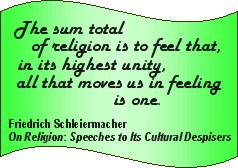| German
theologian and philosopher remembered as "the father of liberalism."
|
 |
|
|
Schleiermacher rejected
both Deism, which reduced Christianity
to morals, and Protestant orthodoxy, which upheld an elaborate system
of doctrines. In his 1799 book, On Religion: Speeches to Its Cultured
Despisers, he tried to show that religion is based on feeling, not
on knowledge or morality. His goal was to gain a hearing for religion
among people who had previously rejected it. Scheiermacher argued that
the essence of religion is the feeling of absolute dependence on God.
This feeling can only be experienced through a profound self-consciousness.
Schleiermacher is remembered as "the father of liberalism" because he
maintained the essence of religion is not revelation outside of the self
but feeling inside of the self. Such religious expression will naturally
change with time and circumstance. Later the historian Adolf
von Harnack argued that doctrine develops within particular historical
contexts; but Karl Barth rejected Schleiermacher's
view that religion is based on feeling.
|